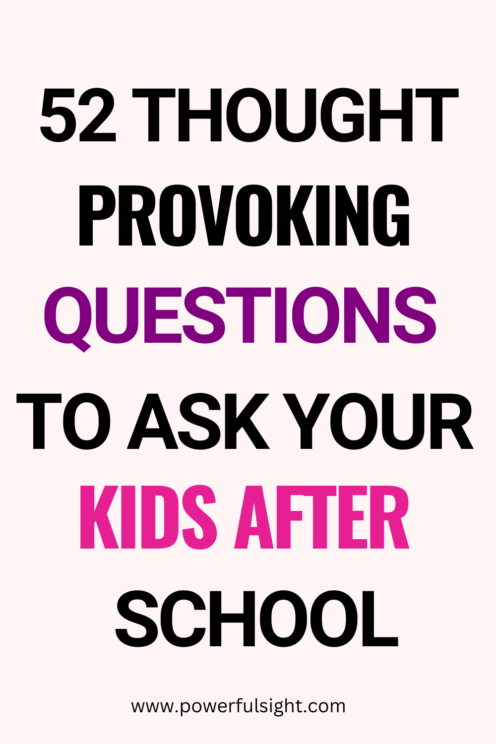As a parent, one of the most important things you can do is to engage with your children and encourage them to share their thoughts, feelings, and experiences.
Asking thoughtful questions after school can be a powerful way to connect with your kids, understand their perspectives, and support their growth and development.
Importance of Asking Questions to Your Kids After School
Asking questions after school can have a profound impact on your child’s well-being and learning. By taking the time to listen and understand their day, you can:
- Strengthen the parent-child bond and foster open communication
- Gain insights into your child’s interests, challenges, and emotional state
- Encourage critical thinking, problem-solving, and creativity
- Promote emotional intelligence and self-awareness
- Cultivate gratitude, mindfulness, and a positive outlook on life
Questions to ask your kids after school
General Questions to Ask About Their Day
Starting with simple, open-ended questions can be a great way to get the conversation flowing. Here are some examples:
- How was your day today?
- What was the best part of your day?
- What was the most challenging part of your day?
- What did you learn in school today?
- Who did you play with or talk to during recess?
- Did anything funny or interesting happen?
- What are you most looking forward to tomorrow?

Questions to Encourage Creativity and Imagination
Engaging your child’s imagination can spark their creativity and help them explore new ideas. Try asking questions like:
- If you could be any animal, what would you be and why?
- If you could have a superpower, what would it be and how would you use it?
- If you could design your own dream house, what would it look like?
- What is the most amazing place you’ve ever imagined visiting?
- If you could invent a new game or toy, what would it be?
Related: How to make your kids more responsible
Questions to Develop Critical Thinking Skills
Encouraging your child to think critically can help them develop important problem-solving and decision-making abilities. Consider asking questions such as:
- What do you think was the most important thing you learned today?
- If you could change one thing about your day, what would it be?
- How do you think you could have handled a challenging situation better?
- What are some different ways you could have solved a problem you faced?
- What are the pros and cons of a decision you had to make?
Questions to Promote Emotional Intelligence
Fostering emotional intelligence can help your child better understand and manage their feelings. Try asking:
- How were you feeling when [specific event] happened?
- What made you feel [happy/sad/frustrated/etc.] today?
- How did you respond when you felt that way?
- What do you think you could do differently next time?
- Who did you talk to when you needed support or comfort?
Related: Parenting mistakes to avoid
Questions to Foster Gratitude and Mindfulness
Encouraging gratitude and mindfulness can help your child develop a positive, resilient outlook on life. Consider asking:
- What are you grateful for today?
- What is something you appreciated or noticed that was beautiful or special?
- How did you take care of yourself or others today?
- What is one thing you’re proud of yourself for doing?
- How can you spread more kindness or positivity tomorrow?
Questions to Encourage Problem-Solving and Decision-Making
Helping your child practice problem-solving and decision-making skills can empower them to navigate challenges more effectively. Try questions like:
- What was a problem you faced today, and how did you try to solve it?
- If you had to make a difficult decision, how would you go about it?
- What are some alternative solutions you could have tried?
- How did you weigh the pros and cons of your choices?
- What did you learn from the experience that you can apply next time?
Related: How to raise God fearing kids
Questions to Enhance Communication and Social Skills
Encouraging your child to reflect on their social interactions can help them develop stronger communication and interpersonal skills. Consider asking:
- How did you express your thoughts and feelings to your friends or teachers today?
- What did you do to be a good listener or teammate?
- How did you handle a disagreement or conflict with someone?
- What did you do to include or support a classmate who was feeling left out?
- How can you be a better friend or classmate tomorrow?
Thought-Provoking Questions to Stimulate Curiosity and Learning
Asking thought-provoking questions can spark your child’s natural curiosity and inspire them to explore new ideas. Try questions like:
- What was the most interesting thing you learned today, and why did it fascinate you?
- If you could ask your teacher one question, what would it be?
- What are you curious to learn more about, and how could you find out?
- How do you think the things you’re learning in school might be useful in the real world?
- What are some ways you could use your talents or interests to make a positive difference?
Questions to Encourage Self-Reflection and Personal Growth
Asking questions that encourage self-reflection can help your child develop a growth mindset and a deeper understanding of themselves. Consider asking:
- What did you do today that you’re most proud of?
- What is something you struggled with, and how can you improve?
- What is one new skill or habit you’d like to work on?
- How do you think you’ve grown or changed since the beginning of the school year?
- What is one goal you have for yourself, and how can I support you in achieving it?
Questions to Strengthen the Parent-Child Bond
Ultimately, the most important thing is to engage with your child in a way that strengthens your relationship and shows them that you care. Try asking questions that demonstrate your interest and investment in their life, such as:
- What was the highlight of your day that you’re most excited to tell me about?
- Is there anything you’d like to share with me that you haven’t already?
- How can I best support you or help you with something you’re working on?
- What is something you’d like to do together this weekend?
- Is there anything else you’d like to talk about before we move on?
Conclusion
Asking thoughtful questions after school is a powerful way to connect with your children, support their growth and development, and strengthen your relationship.
If you want to know how your child’s day went or to know more about their school, use the above questions to get them to reveal certain information to you.
Save the pin for later
